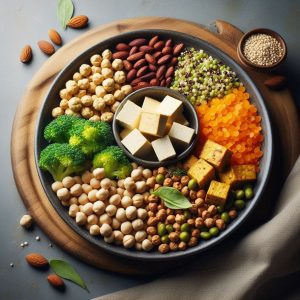
Protein is an essential macronutrient that plays a crucial role in the human body. It’s often referred to as the building block of life, and for good reason. These are involved in virtually every cellular function, from repairing tissues and making enzymes and hormones to supporting the immune system.
The Importance of Protein in the Human Body
Muscle Repair and Growth: It is vital for repairing and building muscles. After physical activity, your muscles need protein to recover and grow stronger. This is why athletes and fitness enthusiasts often focus on high-protein diets.
- Enzyme Function: Enzymes, which are proteins, are necessary for countless biochemical reactions in the body. They aid in digestion, energy production, and nutrient absorption.
- Hormone Production: Many hormones are proteins, such as insulin and growth hormone. These hormones regulate various bodily functions, including metabolism and growth.
- Immune System Support: Antibodies, which help fight off infections, are made of proteins. Adequate protein intake is essential for a robust immune system.
- Transport and Storage: Proteins such as hemoglobin transport oxygen in the blood, while others store important molecules for future use.
Achieving 70 Grams of Protein Daily with Vegetarian Foods
While many people believe that getting enough protein on a vegetarian diet is challenging, it’s entirely feasible with the right food choices. Here are some excellent vegetarian sources of protein:
- Legumes:
- Lentils: One cup of cooked lentils provides about 18 grams.
- Chickpeas: One cup of cooked chickpeas offers around 15 grams.
- Black Beans: One cup of cooked black beans contains approximately 15 grams.
- Dairy Products:
- Greek Yogurt: One cup of Greek yogurt provides roughly 10 grams.
- Cottage Cheese: Half a cup of cottage cheese has about 14 grams.
- Milk: One cup of milk offers around 8 grams.
- Paneer: 100 grams of paneer has around 20 grams.
- Soy Products:
- Tofu: Half a cup of tofu contains about 10 grams.
- Tempeh: One cup of tempeh provides approximately 31 grams.
- Nuts and Seeds:
- Almonds: A quarter cup of almonds contains around 7 grams.
- Chia Seeds: Two tablespoons of chia seeds offer about 4 grams.
- Pumpkin Seeds: One ounce of pumpkin seeds provides roughly 7 grams.
- Whole Grains:
- Quinoa: One cup of cooked quinoa contains about 8 grams.
- Oats: One cup of cooked oats offers around 6 grams.
Making a Protein-Rich Lifestyle Enjoyable
- Variety is Key: Rotate different sources to keep meals interesting and ensure a wide range of nutrients.
- Experiment with Recipes: Try new recipes that incorporate high-protein foods. There are countless delicious vegetarian dishes that are rich in protein.
- Plan Ahead: Meal planning helps ensure you have protein-rich foods readily available and reduces the temptation to opt for less healthy options.
- Stay Informed: Keep learning about new vegetarian sources and ways to include them in your diet.
Thank you for being a part of this learning journey. Please share if you like it !
Gyaanology Team
By incorporating a variety of high-protein foods into your meals, you can enjoy the numerous health benefits that come with adequate intake. Start today, and experience the difference a protein-rich diet can make in your overall well-being!
Leave a Reply